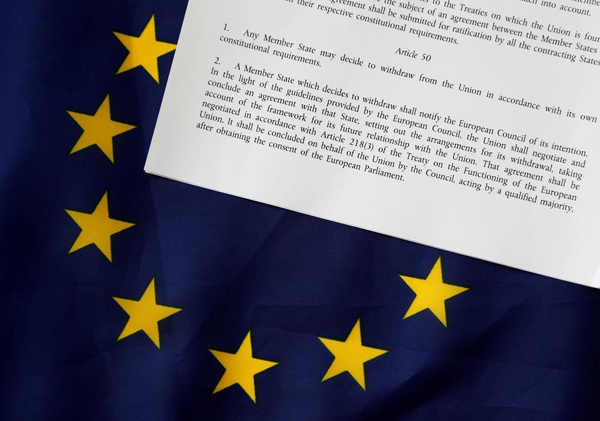High Court: Parliament must vote before Brexit
 |
|
Article 50 of the EU's Lisbon Treaty that deals with the mechanism for departure is pictured with an EU flag following Britain's referendum results to leave the European Union, in this photo illustration taken in Brussels, Belgium, June 24, 2016. [Photo/Agencies] |
Judges rule that the government must not trigger Article 50 without the support of MPs
British Prime Minister Theresa May's plan for the UK to leave the European Union after her government invokes Article 50 were thrown into chaos by a High Court ruling that said the UK's Parliament must approve such a move.
The Bar Council, which represents senior lawyers in England and Wales, said the ruling was "of major significance for the future of this country".
The decision, which the government said it would appeal against in the Supreme Court, was described by the Financial Times as a"thunderbolt".
A group of private citizens, led by financial consultant Gina Miller, had sought a judicial review of the government's intention to invoke Article 50 without first consulting Parliament.
May had planned to do so, essentially making a formal declaration of the UK's intention to leave the EU, before March by using an ancient power called the Royal Prerogative, something that would not have required a vote in Parliament. However, the panel of three judges said Parliament must have its say.
Liam Fox, the international trade minister and a leading campaigner for Britain to leave the EU, told the BBC: "The government is disappointed by the ruling. The country voted to leave in a referendum sanctioned by Parliament."
The pound, which had slumped to its lowest level in 30 years after the referendum result, rose sharply by 1 percent against the dollar and euro, boosted by both the ruling and fresh data from the Bank of England, which raised its growth rate projections for 2017.
The Supreme Court had previously indicated it would hear any appeal quickly, and aim to deliver its judgement before Christmas, probably between Dec 5 and 8.
On June 23, Britons shocked the political establishment by voting in a referendum, 52 percent to 48 percent, in favour of leaving the EU.
Miller said after the ruling:"This case was about parliamentary democracy and not about process, and the government should accept this ruling and give up its right to appeal to the Supreme Court."
Nigel Farage, the leader of UKIP, the party whose main policy was to leave the EU, said he was disappointed. He told the BBC: "I now fear every attempt will be made to block or delay triggering Article 50. They have no idea of the level of public anger they will provoke."
In its ruling, the High Court said its decision was taken purely on constitutional grounds, without any political interpretation.
If a vote ends up being taken in Parliament, there is a danger, as far as the government is concerned, that MPs could vote to reject the government's plans to invoke Article 50.
According to a Bloomberg Survey, 73 percent of the 650 members were in favour of remaining within the EU before the referendum.
Lord Kerr, a Scottish peer who wrote Article 50 for the Lisbon Treaty, told the BBC in an interview that the process of leaving the EU was not irrevocable. He said the UK could elect to remain in the community, even after exit negotiations had started, after the formal process was triggered.
Assuming the Supreme Court upholds the High Court ruling, analysts say the government has a variety of options, including negotiating a so-called soft exit and even calling a general election.
Bo Leung in London contributed to this story.
To contact the reporter: chris@mail.chinadailyuk.com


















